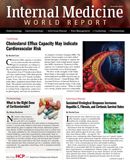Non-invasive Colon Cancer Screen Effective
More than 23 million Americans who should be screened for colon cancer have not yet been screened. To the extent that lapse is due to patients' reluctance to submit to a colonoscopy, a non-invasive stool test could help – if it is effective. A research team looked at such a test, one made by Exact Sciences Corp. and approved in November, 2014 for Medicare reimbursement.

More than 23 million Americans who should be screened for colon cancer have not yet been screened. To the extent that lapse is due to patients’ reluctance to submit to a colonoscopy, a non-invasive stool test could help — if it is effective. A research team looked at such a test, one made by Exact Sciences Corp. and approved in November, 2014 for Medicare reimbursement.
The test, marketed as Cologuard, is a DNA test that includes quantitative molecular assays for KRAS mutations, aberrant NDRG4 and BMP3 methylation, and Beta-actin, plus a hemoglobin immunoassay.
Reporting in the New England Journal of Medicine, Thomas Imperiale, MD at the Indiana University Medical Center, Indianapolis, IN, and colleagues compared the DNA test’s effectiveness vs. a fecal immunochemical test (FIT) in persons of average risk of colon cancer. The FIT, which checks for fecal occult blood, is made by Polymedco.
There were 9,989 participants at 90 sites throughout the US and Canada. All were asymptomatic and from 50 to 84 years old. All agreed to undergo colonoscopies. Before getting the procedure, they provided stool specimens, which were analyzed with the DNA test and the FIT.
The primary outcome was to see how well the DNA test did at detecting cancer and the secondary outcome was to see if it picked up precancerous lesions.
Among the participants, colonoscopy found 65 cases of cancer. A total of 757 patients had precancerous lesions.
The DNA test accurately identified 60 of these patients. The FIT identified 48 patients.
“Multi-target DNA testing detected clinically significant lesions more efficiently than FIT,” the authors concluded.
Extrapolating their results to a hypothetical population of 10,000 patients, “the various screening techniques of colonoscopy, DNA Testing, and FIT would identify, respectively, 65, 60, and 48 persons with colorectal cancer; 758, 321, and 180 persons with advanced precancerous lesions; 2896, 498, and 220 persons with nonadvanced adenomas; and 6281, 732, and 248 persons with non 732, and 248 persons with non-neoplastic findings or negative results on colonoscopy,” the team concluded.
There were also some false positives with the DNA test and the FIT. DNA testing’s false positive rate was an estimated 1,230 of 1,611 positive results (76.4%) which was higher than with FIT’s rate of 67.2%.
Of greater concern, there were also false negatives. The DNA test did not pick up 5 cancers and the FIT missed 17 cancers.
But in the face of low screening rates, the non-invasive test could “provide an option for persons who prefer noninvasive testing,” the team wrote.
Exact Sciences funded the study.
